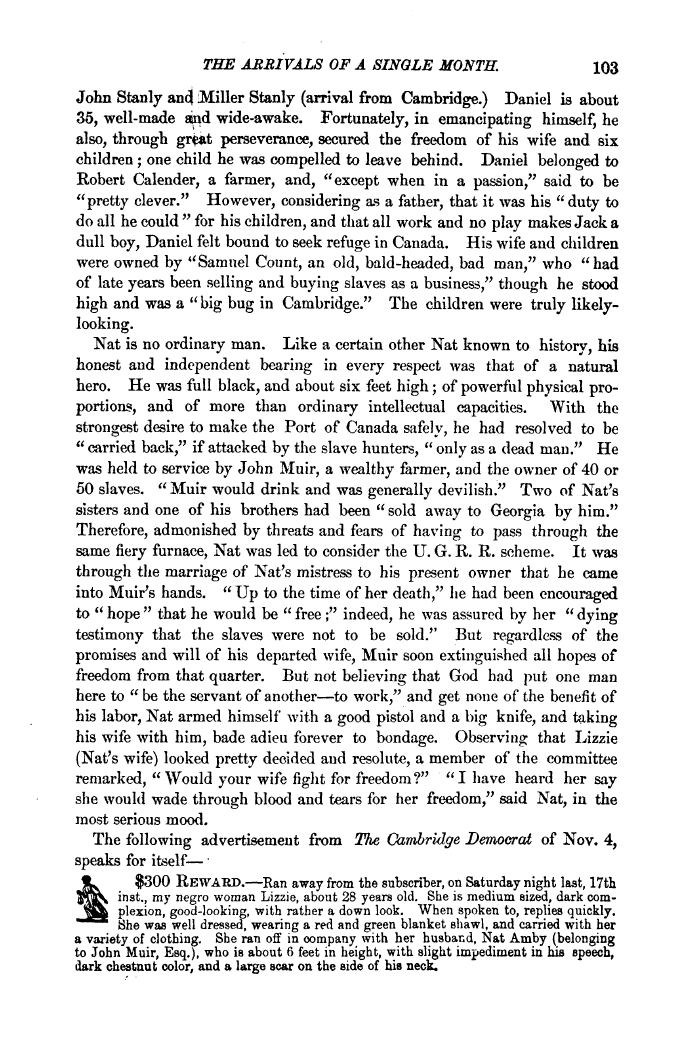 |
||||
 |
||||
| THE ARRIVALS OF A SINGLE MONTH. 1Q3 John Stanly anc| iMiller Stanly (arrival from Cambridge.) Daniel is about 35, well-made and wide-awake. Fortunately, in emancipating himself, he also, through gr^nt perseverance, secured the freedom of his wife and six children ; one child he was compelled to leave behind. Daniel belonged to Robert Calender, a farmer, and, "except when in a passion," said to be "pretty clever." However, considering as a father, that it was his "duty to do all he could " for his children, and that all work and no play makes Jack a dull boy, Daniel felt bound to seek refuge in Canada. His wife and children were owned by "Samuel Count, an old, bald-headed, bad man," who "had of late years been selling and buying slaves as a business," though he stood high and was a " big bug in Cambridge." The children were truly likely-looking. Nat is no ordinary man. Like a certain other Nat known to history, his honest and independent bearing in every respect was that of a natural hero. He was full black, and about six feet high; of powerful physical proportions, and of more than ordinary intellectual capacities. With the strongest desire to make the Port of Canada safely, he had resolved to be " carried back," if attacked by the slave hunters, " only as a dead man." He was held to service by John Muir, a wealthy farmer, and the owner of 40 or 50 slaves. " Muir would drink and was generally devilish." Two of Nat's sisters and one of his brothers had been " sold away to Georgia by him." Therefore, admonished by threats and fears of having to pass through the same fiery furnace, Nat was led to consider the U. G. R. R. scheme. It was through the marriage of Nat's mistress to his present owner that he came into Muir's hands. " Up to the time of her death/' lie had been encouraged to " hope " that he would be " free ;" indeed, he was assured by her " dying testimony that the slaves were not to be sold.'' But regardless of the promises and will of his departed wife, Muir soon extinguished all hopes of freedom from that quarter. But not believing that God had put one man here to " be the servant of another—to work," and get none of the benefit of his labor, Nat armed himself with a good pistol and a big knife, and taking his wife with him, bade adieu forever to bondage. Observing that Lizzie (Nat's wife) looked pretty decided and resolute, a member of the committee remarked, "Would your wife fight for freedom?" "I have heard her say she would wade through blood and tears for her freedom," said Nat, in the most serious mood. The following advertisement from The Cambridge Democrat of Nov. 4, speaks for itself— $300 REWARD.—Ran away from the subscriber, on Saturday night last, 17th inst., my negro woman Lizzie, about 28 years old. She is medium sized, dark complexion, good-looking, with rather a down look. When spoken to, replies quickly. She was well dressed, wearing a red and green blanket shawl, and carried with her a variety of clothing. She ran off in company with her husband, Nat Amby (belonging to John Muir, Esq.), who is about 6 feet in height, with slight impediment in his speech, dark chestnut color, and a large scar on the aide of his neck. |